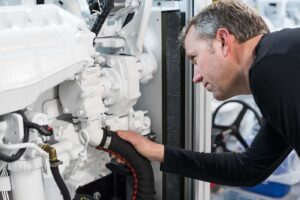Are you a boat owner looking to update/upgrade your existing vessel or one you may acquire. It is no secret that diesel internal combustion engines are the most efficient and cost-effective choice when it comes to powering a vessel at this point in time. If so, understanding the difference between commercial marine diesel, recreational marine diesel, and industrial diesel is essential. Marine and commercial marine diesel has been specifically developed for use in watercraft while Industrial Diesel serves many purposes on land. In this blog post, we will explain the key differences between these three types and focus on which would be better suited for keeping your boat running at its best. Keep reading to gain a comprehensive understanding of how each type of diesel works — and why one may be more beneficial than the other for ensuring long-term performance on the open seas!
Exploring the Basics of Diesel Engines

Diesel engines are an essential part of the transportation industry, powering everything from semi-trucks to cargo ships. Unlike gasoline engines, diesel engines rely on compression rather than spark ignition to combust fuel. This key difference allows diesel engines to achieve higher fuel efficiency and torque, making them a popular choice for heavy-duty vehicles. Diesel engines can range in size from small generators to massive industrial machines, but they all have a few basic components in common, including a fuel pump, fuel filter, and fuel injectors. Exploring the basics of diesel engines can provide a deeper understanding of how these powerful machines work and their vital role in transportation and industry.
Basic Diesel Engine Principal
No matter what it is used for, all diesel engines are based on the principal of compressing fuel to the point of explosion. Obviously, this happens inside the cylinder and drives the piston down, turning the crank shaft creating torque (rotational power). That then is dispersed to the drive train via transmission and what ever the propulsion need is, i.e. Propellor, jet drive, pump, generator, or whatever.
Identifying the Different Factors that Separate Marine and Industrial Diesel Engines
Marine and industrial diesel engines may seem similar at first glance, and they are at the core, but there are several factors that set them apart. One major difference between the two is their cooling and exhaust designs. Marine engines are enclosed deep inside the vessel and do not have access to cooling air, so cooling is achieved by pumping seawater through the heat exchanger (liquid to liquid) so the coolant liquid which runs through the engine block gets cooled appropriately. Then the exhaust must be routed out of the engine compartment usually with that heated seawater. This process develops some caustic processes that if they were not correctly designed for, it would allow the heated seawater to dissolve components of the engine.
The industrial engines use a Radiator with an Air-to-Liquid heat exchanger. Same as in 90% of all automobiles out there. The exhaust gases then escape the combustion chamber into the atmosphere. There are requirements on land-based engines to comply with EPA Tier IV standards. This adds “treatment” to the system that Marine engines do not yet use.
Another big difference in the industrial vs. marine is the operating RPM. The marine propulsion diesel requires multiple speeds or varying RPM. The majority of industrial diesel are fixed speed applications. Once your rock crusher is turned on and operational, it will usually stay at 1200 or 1800 RPM to do its job. Therefore, they tend to get more running hours out of similar HP ranges. Marine engines, however, are directly connected to the drive like your car, and must work at variable speeds. This adds to wear and tear.
So when comparing diesel engines for use, it is not practical to think of these engines as the same. Just like all humans have the same basic design (Musculature, skeletal, circulatory, digestive, nervous system) there are different types for different jobs. A sprinter is different from an offensive football tackle. Same machine, different application.
Choosing the Right Diesel Engine with Mack Boring
The experts at Mack Boring and parts can walk you through all of your specific needs. Unlike most distributors, we actually have on staff engineers to help with the design and layout of your particular need. To learn more, please visit our website and get in touch with us today!





